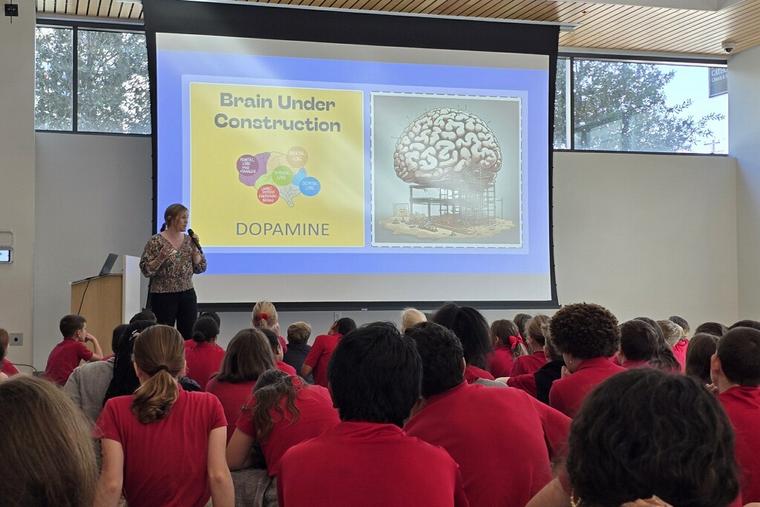By Jonah McKeown
Copyright ncregister

For many parents, the dangers and downsides of giving their children smartphones — the time wasted scrolling online, potential exposure to inappropriate content, and the anxiety and depression that can come from social-media addiction — are obvious.
What is far less obvious to many parents, in a society saturated with smartphone use among adults and children alike, is how to say “No” when their son or daughter asks for one.
One Catholic-founded Texas-based group is attempting to offer a solution: banding school parents together under a pledge to keep smartphones and social media out of their kids’ hands, based both on a Catholic vision of the human person as well as scientific evidence about the development of the young brain.
It’s hardly a wonder why parents who decide not to give their children personal, internet-connected devices feel like outliers.
A 2025 study by Common Sense Media (CSM) found that 1 in 4 children in the U.S. are given a smartphone by age 8. A different study surveyed 1,500 kids and found that two-thirds were given their first smartphone when they were 10 or younger.
Half of children age 0 to 8 have their own mobile device, either a smartphone or a tablet, with 44% of children owning one mobile device and 5% owning both a cellphone and a tablet, the CSM study says. Meanwhile, a staggering 95% of teenagers have their own smartphone.
Enter Smart Families, an initiative founded just over two years ago by a Catholic husband and wife, Brian and Jennifer Kuzma, which has grown in just three years from a single Houston Catholic school to a presence in more than 113 schools across the United States and United Kingdom.
Smart Families provides educational materials, newsletters, expert speakers and workshops for both kids and parents, and other support to schools to encourage parents in their decision to withhold smartphones from their children for as long as they can. The program currently employs 10 full-time staff and draws on advisory board members that include doctors and mental health professionals.
Brian Kuzma said demand for their program among Catholic-school parents and principals is “off the charts.”
“You can see that it’s the No. 1 thing that parents are most concerned about when they’re raising their children. And they just need leadership, and that’s the whole idea of Smart Families,” Kuzma, who has a background in engineering and finance, told the Register.
“The schools, the parents and the kids can rely on us to be the experts. It really lowers the threshold of effort that’s required to [create a phone-free environment] in the community.”
Smart Families joins a growing movement among parents of various faiths, inspired principally in recent years by the work of U.S. child psychologist Jonathan Haidt, to take new and drastic steps to counter the effects of smartphones and social media among their children.
Around the world, more parents are seeking an alternative to the prevailing wisdom about smartphones — not wanting their kids to be isolated with no options for interaction — while also building for their families and children alternative means of connection and community.
How It Started
With their oldest child about to enter fourth grade in 2023, the Kuzmas approached their principal at their parish school, St. Vincent de Paul in Houston, offering to lead an initiative to band parents together to create a smartphone-free school community. That year, the Kuzmas invited their fellow school parents to join them in a pledge that they would withhold smartphones from their children until at least the age of 16.
Kids could still stay connected with their parents and friends, but would need to find non-internet means of doing so: landlines, for example.
“To our pleasant surprise, more than half of the parents at the school signed the pledge that first year, and we realized we should professionalize this,” Kuzma continued, pointing out that most schools don’t have the resources to do the necessary rigorous research themselves.
Digging into the latest studies on smartphone use in children only strengthened the Kuzma’s convictions. Modern neuroscience reveals that it is uniquely difficult for children to resist the addictive quality of smartphones and other internet-connected tech.
Studies cited in a 2023 U.S. surgeon general’s advisory suggest that frequent social-media use particularly affects the developing brain in the amygdala (important for emotional learning and behavior) and the prefrontal cortex (important for impulse control, emotional regulation and moderating social behavior). The prefrontal cortex, as Smart Families advisor Crystal Collier explains, doesn’t fully mature until around age 25, and its development and growth are contingent on how the brain is utilized until then.
Jennifer, a former elementary-school teacher, said parents almost always respond to Smart Families’ introduction with relief. Far from being outliers, parents are often grateful to discover many others share their concerns.
“You think you’re the only one that feels this way, and then once we come in and have these initial meetings, we realized, no, most people feel this way. It’s just the perception that you’re the only one,” Jennifer said.
At its core, Smart Families’ message is spiritual as well as scientific: Children deserve authentic human connections because of their God-given dignity. Brian said their goal is to help to create families that are “sacred and set apart” and able to offer something attractive to the broader world, rather than conformity to a conventional smartphone-centric lifestyle.
“The people who are most receptive to the message, the most passionate supporters, are Catholics who go to Mass on Sunday, those who are most devout in their spirituality,” Brian noted.
“Catholics can understand that our material selves are a key part of our spiritual selves. And the No. 1 victim of technology today is our prayer lives.”
The program is privately funded by the Kuzmas through a foundation that they run, which granted $205,000 to Smart Families in 2023, according to its tax forms. The private funding model — which Brian described as their “gift” to the Catholic community — currently allows Smart Families to provide its materials free of charge to any school that wants them.
“Most parents understand that their kids are not getting the childhood they want them to have. They’re bringing smartphones into their lives because they want to stay connected and don’t want their kids to be left out,” Brian said.
“But let’s take a time out and think about ways to solve these problems, rather than just doing what everybody else does,” he urged.
How Does It Work?
Smart Families’ pledge — which any parent can sign online, if they wish — centers around a simple agreement to delay giving children smartphones until at least high school. The organization also advocates keeping kids off social media until at least age 16, as well as prioritizing family time and fostering family values.
Hillary Caceres, Smart Families’ executive director, told the Register in an interview that the goal is not to coerce parents into a decision one way or another, but rather to provide the necessary information so that parents can make the best decision for their family regarding smartphones.
As a mother of three Catholic schoolgirls, Caceres said she was floored to learn how crucial the formative years are for real human connections. Many parents are surprised by the evidence, she said.
“If you have given them a smartphone, that is a decision you’ve made, and we’re not here to say that was wrong. But hear us out, and learn a little bit about what’s going on with your child’s brain. Learn about what they have access to, and you need to be the first one to tell them about the dangers,” Caceres said.
“You need to teach them about why they need to spend time off the phone and why it’s so important for them to maintain human interaction. … If you don’t do that, who’s going to?”
Smart Families isn’t anti-tech, though — it’s fine for kids to use technology to stay in touch, Caceres said, but not with a device that gives them unfettered access to the internet. Basic talk-and-text “dumb phones,” or filtered services like Bark or Gabb, can be a great option for families looking to keep their kids connected and safe.
Most Catholic schools already restrict their students’ use of phones while on campus; even among public schools, at least 10 states have banned phones at school at the statewide level. Smart Families’ parental pledge, which goes further, is entirely voluntary, even for parents at participating schools.
Parents who do sign the pledge gain a strong sense of solidarity with each other — in many cases, parents wanting to withhold smartphones have historically felt isolated and alone, Caceres said.
“What’s really nice is you feel a little bit more comfort when you drop that child off for a play date. You don’t have to worry about what they might be doing when they’re not being completely supervised, especially as children enter middle school, when you’re not really playing with them, or watching them as closely,” Caceres said.
“When you know potentially that 60% to 70% of the other parents in your school have signed the pledge, you feel a lot more comfortable thinking, ‘Okay, at least I know that our kids’ friends won’t be on a smartphone while they’re there playing.’ It’s a beautiful gift to offer your children and yourself.”
‘A Huge Benefit’
Galveston-Houston was the first diocese in Texas to partner with Smart Families, launching the program in 18 of its Catholic schools in 2023. (In Galveston-Houston, the program is branded as “Smart Families Shaping Souls.”)
Several of those participating schools, such as St. John Paul II Catholic School (StJPII) in Houston, are nationally recognized for their excellence as “Blue Ribbon Schools,” the highest award bestowed to schools by the U.S. Department of Education.
Rebecca Bogard, principal at StJPII — which is also the largest school in the archdiocese —told the Register that roughly 60%-70% of their families have taken Smart Families’ pledge.
Bogard said it has been a huge boon to the school to have the Smart Families’ staff available to provide expert advice, training and resources to school staff and to parents. Plus, there’s no monetary cost.
Since the program is so new, StJPII is still in the beginning stages of seeing how it will change the school long term. On the whole, parents are happy, and teachers are noticing positive differences in the classroom, in terms of student attention spans and motor skills, Bogard said.
“When [Smart Families] takes that burden off the school, that’s a huge benefit,” she said. “Parents don’t have to participate; it’s just an added benefit as they’re trying to raise their children to be Godly people.”
Tara Cevallos, principal at St. Austin Catholic School in Austin, another “Blue Ribbon School,” said families are craving help and support. St Austin’s was the first school in Austin to sign on to the program, and when the school implemented it, Cevallos said she “didn’t get one single email arguing the other way.”
Smartphones have such an outsized effect on a child’s holistic education, she noted, that schools should seriously consider a greater intervention on smartphones beyond phone-free school days.
“The implications are so large, [but] we can change the trajectory for these kiddos. If we can stave off the damage until their brains are more fully formed, that can really help their human development,” Cevallos said.
Another principal, Jeff Matthews of St. Ceclia Catholic School in west Houston, said joining the Smart Families program provided a “common language” and consensus of support among parents.
“Many families felt it was something they wanted to do, but felt they were the only one. They were always afraid their students were going to be left out,” Matthews said.
“If we all kind of bind together here, maybe we can resist the pressures from our own kids,” he recalled of the parents’ realization.
Now in its third school year of existence, Smart Families isn’t slowing down. Catholic dioceses across the country are reaching out with interest in bringing the program to their schools; the Diocese of Wichita, Kansas, for example, just launched the program in more than a dozen of its schools this year.
For Brian and Jennifer, their work with Smart Families is an extension of their faith. Brian recalls hearing God’s voice while kneeling before the Blessed Sacrament in adoration, calling on Brian to devote the whole of his energy and his resources to this project, which he called a “dramatically underserved mission.”
Brian said: “Everyone is dealing with this [smartphone problem], and the Catholic Church offers such a beautiful response. We have to accept our own humanity first, and then we can really offer something to the world that they’re not getting: offer authentic humanity back to people.”



